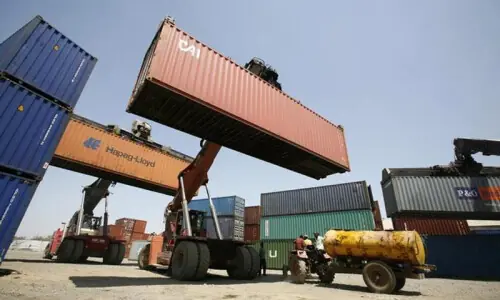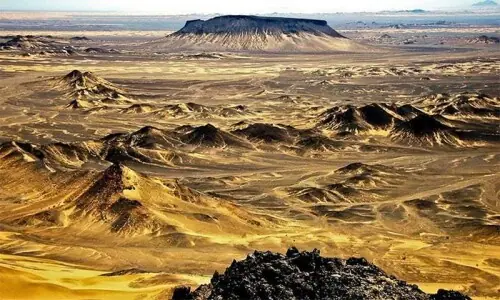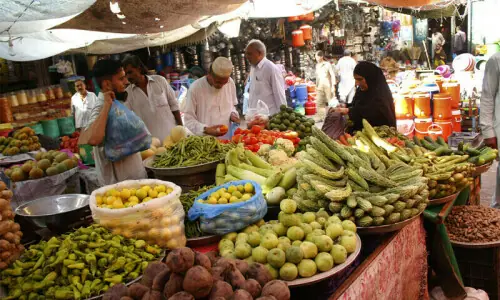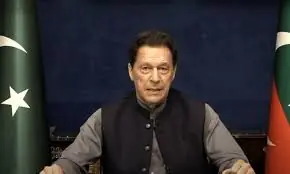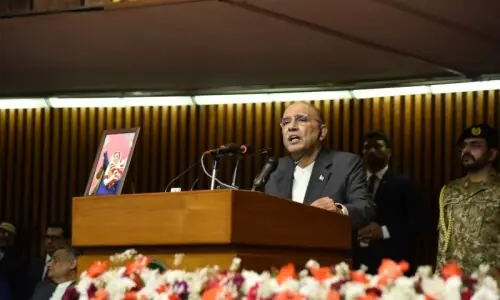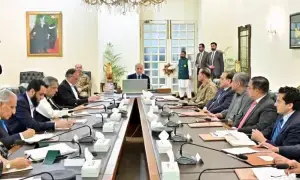 Why should Pakistan’s policymakers — or, for that matter, the country’s citizens — be interested in the meeting of the G 8 industrial countries held in a remote corner of Japan. The answer is simple. It is because of globalization, a process that began a couple of decades ago as most large economies lowered the barriers to the movements of commodities, goods and capital. The result is a world economy that is better integrated as never before. What happens in one large country affects the rest of the world.
Why should Pakistan’s policymakers — or, for that matter, the country’s citizens — be interested in the meeting of the G 8 industrial countries held in a remote corner of Japan. The answer is simple. It is because of globalization, a process that began a couple of decades ago as most large economies lowered the barriers to the movements of commodities, goods and capital. The result is a world economy that is better integrated as never before. What happens in one large country affects the rest of the world.
It was the adverse consequences of a development some thirty years ago that first brought together the industrial countries. They met to formulate their response to the sudden increase in the price of oil in the mid to late 1970s. That increase in price was orchestrated by the Arab members of the cartel of oil producing and exporting countries, the OPEC, to show their displeasure at the West’s one-sided approach to the Israel – Palestinian conflict.
The first time the leaders of the industrial world met as a group, there were seven countries involved – Canada, France, Germany, Italy, Japan, the United Kingdom and the United States. Later, after the dissolution of the Soviet Union, the group added Russia to its ranks and the G-7 thus became the G- 8.
About a decade ago, the group also began to invite the leaders of some other major economies without having them become full members. Also in attendance are the President of the European Union and the heads of the IMF and the World Bank. The chairmanship of the G- 8 conclave rotates amongst its members along with the venue of the meetings. The presiding country has some role in determining the agenda and in issuing invitations to the non-G 8 countries to attend. It has become customary for the leaders of the BRIC nations – Brazil, Russia, India and China – to attend the meetings.
In 2007, when the G 8 leaders met in Germany’s seaside resort of Heiligendamm, no one was even remotely aware of the havoc the collapse of the United States’ sub-prime housing market would visit on the global economy. No one was expecting that the price of a barrel of oil would increase from $ 65 to $ 140 or that the price of a ton of rice would more than triple, from $ 300 to $ 1000. Anxiety about the price rise of oil undermining the global economy was absent from the deliberations of the G 8 since its early days.
Also absent were concerns about feeding the world’s poor. The last time G 8 leaders discussed the subject of world food production was back in 1981 at the Ottawa summit when they emphasised in their communiqué “the importance of accelerated food production in the developing world and of greater world security.”
It seemed to the then leaders of the group that simple exhortation would keep the developing world on its toes. All that was needed was a gentle reminder that the sector of agriculture needed the continued attention of the world. Governments had become complacent because of the gains made after the spread of the green revolution in the 1970s.
At the 2008 meeting, the G 8 leaders chose to concentrate their attention on five areas: the state of the global economy; the sharp increase in the price of oil and its consequence for different parts of the world economy; the sharp rise in the price of food grains and its impact on the incidence of poverty; global warming and controls on carbon emissions and, finally, the situation in sub-Saharan Africa, particularly the crisis in Zimbabwe. Four of these five items are of direct concern for a country in Pakistan’s situation.
The Japanese hosts assembled two sets of leaders other than those from the G 8 countries to help their understanding of the items on the agenda. A group of African leaders were called in discuss the continent’s economic prospects and how the G 8 countries could help in the process of growth. The leaders reminded the developed world about its pledge to double economic assistance to the continent. The commitment was given at the G 8 summit in Gleneagles hosted by Tony Blair, then Britain’s prime minister.
On the question of carbon emissions, the G 8 leaders reached a weak compromise, making an unenforceable commitment to reduce by one-half the amount of carbon that was being thrown into the atmosphere and to achieve that target by the year 2050. The response from the NGO was fast and sharp; the coalition of groups working in the area of environment declared that such a pledge would not help reduce global warming. It would further deteriorate the situation in such water-stressed countries as Pakistan.
On agriculture, the G -8 pledged to increase their assistance for improving land productivity. Food production will need to increase by 50 per cent by 2030 in order to save the developing world from famines and to cater to the increase in demand in those countries that are growing rapidly. However, much of this production increase is likely to come from the large farms in developed countries. For it to become available for developing countries, their purchasing power must increase which is unlikely in the required amounts. The only way out is to provide government grants to the poor countries. However, the proportion of development assistance for agriculture has fallen to less than three per cent from 18 per cent in 1979. At the summit, the UN Secretary General referred to the need to invest up to $20 billion a year in agriculture, half of which needs to come from aid.
The performance of the G- 8 summiteers at their recently concluded meeting in Hokkaido, Japan seems to confirm the belief shared by a number of analysts that the group is no longer very relevant for addressing the concerns about the status of the global economy. The diminishing presence of the G 8 countries in the global economy is well illustrated in the IMF data presented in the accompanying table. While the G -8 countries still have a very significant share of global output – estimated at 63.5 per cent by the World Bank for 2005 – some of the countries outside the group have more dynamism. The four BRIC countries accounted for 30 per cent of the addition to global product in 2007, compared to about a quarter for the G 8 nations.
In other words, the future belongs to the BRICs, other large developing countries and to the oil exporting countries and not just to the G 8. This would suggest that if a group of countries is to hold an economic summit every year to decide on approaches and actions concerning the global economy and the difficulties it faces, it has to be a group larger in size than eight countries that are seeing a reduction in their share in global output.
Could Pakistan gain admission into such a group? It could on the basis of the size of its population which is now the sixth largest is the world. It could also be admitted because of its geographical position in the heart of the more troubled areas in the world. But the country will have to manage its affairs, both economic and political, before any such claim would be taken seriously by the international community.

